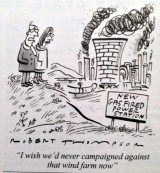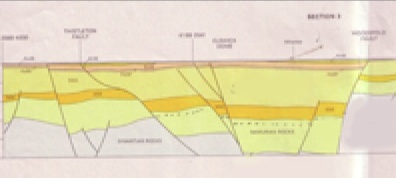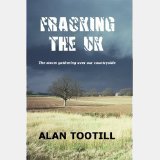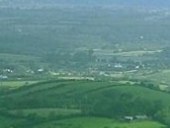Did you hear the joke about fracking and jobs
We keep hearing it – Cuadrilla repeat it at every turn because they know that it is one of their routes to gaining community acceptance.
We, and many others have questioned the promised employment boom on the basis that whilst a few temporary local jobs would of course be created (Cuadrilla suggest as many as 1,700 for as long as ten years), there are many more jobs in tourism and agriculture, for example, that could be put at risk.
Now a report on a new study in Ohio validates those fears It seems that whilst fracking does temporarily increase sales receipts in a fracked area, this doe NOT translate itself into any growth in jobs.
As Tish O’Dell, co-founder of the group Mothers Against Drilling in Our Neighborhoods (MADION) in the Cleveland suburb of Broadview Heights, said:
“the number of jobs created by fracking should be measured against the possible impacts on industries including farming, dairies and tourism. If you were going to do a really serious study you would look at these things,” she said. “If water is contaminated and fish die, what are the fishermen going to do? If you have parks where people go for peace and quiet, what happens when you turn it into an industrial landscape? If you have an organic dairy and the soil is polluted, what does that mean? These are all valid questions.”
The Columbus Despsatch reported the Ohio Governor,John Kasich, as saying:
“You could have a situation where we are not getting the jobs, [the oil and gas companies are] taking the resources, and all their profits and they’re heading home,” Kasich said. “That is not acceptable to me. Now, we don’t have the conclusive evidence that this is happening yet, but I want you all to know, and I want the companies to know that this is an extremely serious matter, and we expect them to be responsive to the people of this state.”
So next time you hear the one about the jobs, and wonder why some peoples’ laughs sound a bit hollow, you now know why.
Should we be worried about Mr Egan?
We are starting to get concerned about the welfare of Francis Egan, CEO of Cuadrilla.
We have noted before that there seems to be something going around locally which makes people forget things that they said recently and then say something which contradicts it shortly afterwards. Our MP, Mark Menzies, had a bout of this mystery ailment when he forgot that the regulatory panel he called for was supposed to be independent and congratulated himself on more than one occasion on being responsible for the decidedly non-independent OFFUGO.
Now Mr Egan seems to have forgotten that the reason why they won’t be drilling this year at Anna’s Road is Cuadrilla’s new-found commitment to responsibility, as evinced by their decision to do a proper Environmental Impact Assessment at Anna’s Road, as he is quoted in the the Garstang Courier today as saying
“…the delays announced last week had hampered its ambitions but insisted the company would do “whatever it takes” to get approval to extract 200 trillion cubic feet of gas.
You’ll have to forgive us if we find it strange that he describes something he is persuading us he is doing voluntarily, and out of sense of what is right, is now hampering his ambitions. And surely even Mr Egan knows that he hasn’t got a snowball’s chance in Hell of extracting 200 tcf of gas from a field which he says contains that amount as a total resource, with recovery rates estimated at around 20%. He’s really not doing very well recently with his PR stuff.
The article is at http://www.garstangcourier.co.uk/news/environment/fracking-on-hold-as-new-sites-planned-1-5512221
In the same piece local hairdresser, IoD bigwig and self-styled fracking expert, John Kersey, bewails the fact that insistence on regulation is going to mean that 1,300 jobs a year for a decade might be missed out on. Given that even Cuadrilla’s most optimistic projections don’t suggest more than 6,500 jobs lasting at most for a decade, we wonder why Mr Kersey thinks we stand to lose twice that many, and why he feels it appropriate to suggest that controls put in place to protect the local population should be ignored on the basis of this highly questionable figure. Perhaps he’s been applying to much volumising shampoo?
Your Involuntary Investment in Shale Gas
One of the little discussed issues around the recent announcement that the government is going to throw tax breaks at an industry which insists it doesn’t actually want or need them (see http://www.refracktion.com/index.php/fracking-and-the-budget/) is that it turns us all into investors in this business, as it is now OUR money which is going to be so generously given away.
The difference , of course , between us and Lord Browne here is that we don’t have the choice as to whether we want my money spent on helping their exploration (we don’t) and if they were to get lucky, then we don’t stand to make a fortune like he does from his 40% stake in Cuadrilla. Oh yes, the other difference of course is that we don’t have huge influence over government energy policy as an unelected mandarin appointing non-executive directors to government departments like he does, but it would be churlish to suggest that he might have any conflict of interest there wouldn’t it?
So should we be worried about my imminent involuntary investment in the shale gas industry? Well let’s put it this way if you gave us £1,000 and said we could invest it in any business that we chose on the basis of expected risk and reward we wouldn’t touch the fracking industry with a sh*tty stick. At very best it is a hugely risky business. The predictable decline rates, storage issues, the vagaries of the energy pricing mechanisms and the potential lawsuits from the growing number of those harmed by the industry mean that this is an industry which attracts the moth-like investors who get taken in by the shiny lights and then risk getting badly burned once they are in close. At worst it has been described by others as a giant Ponzi scheme. We think that’s a little unfair but we can see where the comparison comes from.
Our page here http://www.refracktion.com/index.php/why-be-concerned/just-how-viable-is-fracking-as-an-industry/ has more information on why we believe this business does not deserve government handouts.
if it is as good as Mr Egan promises us then he doesn’t need tax breaks. If he is exaggerating then our money should not be being thrown at his company in this ludicrous way. The government appears not to have done the “due diligence” that any public company would be expected to do before promising this kind of investment. If they haven’t then they have failed in their responsibility to us, the electorate in general and the people of the Fylde in particular.
Fracking and the Budget
As expected George Osborne used his budget speech on Wednesday to express government support for the fracking industry. He said:
In the spending round, we will provide support for energy-intensive industries beyond 2015. For the North sea, we will this year sign contracts for future decommissioning relief, the expectation of which is already increasing investment there. But I also want Britain to tap into new sources of low-cost energy such as shale gas, so I am introducing a generous new tax regime, including a shale gas field allowance, to promote early investment. By the summer, new planning guidance will be available alongside specific proposals to allow local communities to benefit. Shale gas is part of the future, and we will make it happen.
Of course, anybody who has been keeping up with this business has to ask why, when even the people who support fracking are lining up to say it doesn’t need subsidies, Mr Osborne insists on giving them money that inevitably has to come from underfunded public services.
“The ludicrous Boris Johnson“who puts on his full buffoon act to cheer-lead for fracking said one of the great things about it is:
It doesn’t need the subsidy of wind power
Peter Lilley speaking to the Energy and Climate Change Committee said:
“I am puzzled by the suggestion that there is any need for a special tax regime. Drilling costs can be written off against corporation tax at present and so, I think, can research and development costs. Why should they require any special incentive? If it is profitable, let them go and do it. If it is not profitable they should not do it.”
Francis Egan, Cuadrilla’s chief executive, stated to the same committee that :
“We are not asking for a special regime.”
Nick Grealy – a paid apologist for the fracking industry and self-proclaimed expert, talking to the same committee gave a very succinct answer to the subsidy question:
Christopher Pincher: That is the United States. Do you anticipate the need for a subsidy here to encourage UK drilling?
Nick Grealy: No.
and yet Mr Osborne still thought it to be appropriate to throw money at people who don’t seem to be able to shout loud enough that THEY DON’T NEED IT!!!
What sort of a way is this to run an economy which is already missing so many targets that you could mistake the man directing it (Osborne) for a blind man in a snowstorm.
Not only this, but there is also private discussion released after an FoI request in the upper levels of government with Cuadrilla about how local communities can be compensated (bought off) for what Mr Egan describes, with admirable understatement, as “a certain inconvenience” that will result from fracking.
It would appear that tax-payers all over the country are going to be asked to further subsidise the activities of our friendly neighbourhood frackers, so they can buy off opposition in the places where they want to operate.
This wheeze may have seemed like a good answer to John Hayes sitting in Whitehall, who no doubt believed that the “aboriginals” and “nimby-numpties” (© Prof Richard Selley – Imperial College) of the North of England are stupid enough to sell their birthrights for a mess of pottage, and thus dig the government out of the fiscal mire it has created recently.
What is becoming increasingly clear, as people educate themselves about what fracking will mean, is that the price of buying off the growing opposition to fracking is higher than the government could possibly afford – even when they are spending other people’s money like water.
So why have Cuadrilla suddenly decided on doing EIAs?
Cuadrilla have not been noted for their commitment to Environmental Impact Assessments. They have built fracking wells with pads that are marginally smaller than the size which would have required mandatory EIAs’ and, as we reported here,
http://www.refracktion.com/index.php/cuadrillas-scoping-document-for-an-eia/ , they have applied, in their EIA scoping documents submitted to LCC, to have very significant areas excluded from the EIA which they will have to undertake for Anna’s Road. These were:
- Socio Economic Impacts;
- Landscape and visual assessment;
- Noise;
- Traffic;
- Archaeology;
- Climate change;
- Agricultural considerations.
All of a sudden though we are being asked to believe that Francis Egan is deeply committed to the idea that EIA’s are the best thing since sliced bread
He tells us that
“Cuadrilla proposes to broaden and deepen the scope of both community consultation and environment risk assessment by completing a full EIA for each exploration well site where we seek planning consent for drilling, hydraulic fracturing and flow testing.”
and, showing an amazing amount of brass neck, that
“Maybe our competitors will give us a bit of grief for setting the bar so high”
(But maybe a bit higher than you really wanted I suspect Francis if your scoping document is anything to go by?)
Now, they had been waiting rather impatiently for nearly 2 years for the unofficial ban on fracking to be lifted. They messed up their drilling at Anna’s road and wasted 3 more months. They expect us to believe that they are prepared to voluntarily go for another year without seeing a penny returned on their already massive investment just because they have suddenly converted to the idea of doing proper EIAs? Really?
Can we expect Mr Egan to be writing to LCC withdrawing that list of desired exclusions to prove that Cuadrilla really “are determined to spare no effort in meeting our exploration targets in an environmentally and socially sustainable manner.”
…. or is there something else behind all this?
Are Cuadrilla perhaps wary of having planning permission refused by LCC.
By waiting for a while perhaps the provisions suggested in the new Growth and Infrastructure Bill will mean that the decision is no longer in the hands of the unpredictable LCC, but can be taken by altogether more reliable and amenable Central government departments.
Another suggestion is that Cuadrilla may now have secured long term funding from a major investor and can now afford to play a long game in search of a European-wide prize. Such a major investor (it might for example be Centrica whose interest was reported in the FT) might be unwilling to risk (further?) reputational damage and so is perhaps insisting that this is is done “properly”. After all some of the big boys like BP are already in deep enough PR mire after events like Deepwater Horizon. Taking this a bit further is this new stance in fact suggestive of a major player who thinks a ‘best practice’ example here in the UK might wedge open the other European Union nations’ resistance to fracking (the long game once again, which even Lord Browne’s supposedly infinitely deep pockets can’t fund) whilst Cuadrilla continue to be the front to take the bullets until such time as the community can be assuaged/ bought off/ ‘fractured’ to a market-acceptable level?
It is inconceivable that a company in Cuadrilla’s financial position would voluntarily delay for a year just to get an EIA done. There is more to this than meets the eye, and these are just two possible explanations. Any other ideas? Let us know!
What’s in a name Cuadrilla?
Sometimes company names can be mildly amusing and appropriate – think “Grate Expectations” for a fireplace shop. Sometimes they can be unintentionally funny – like the now legendary “S.T.D. Contractors” service company in Pontiac near Detroit.
Sometimes though people’s choices of company name can be unexpectedly revealing. Yes, we are talking about our friends Cuadrilla.
You may not know that a Cuadrilla is a Spanish word for a matador’s team of assistants, including picadors and banderilleros who goad and weaken a fighting bull before the matador comes in and takes over for the flashy kill. One bullfighting aficionado suggests that the banderilleros are often “failed” bullfighters.
We can only praise Cuadrilla for having chosen a name which so accurately reflects their role here in Lancashire.
They are here as pathfinders. They are working at softening up opposition in the community just like the cuadrilla weaken the bull. They are doing this by bestowing largesse on youth groups, promising spurious jobs, and insinuating, without any evidence and against the generally accepted informed opinion, that our gas prices will behave as they have done in America.
It was alleged in the FT in January that this Cuadrilla were in talks with Centrica to sell them a major stake in the business. What does seem certain is that this tiny group of banderilleros is not in a position to kill the local bull without bringing in the help of a major matador like Centrica.
What they (and we) must not forget is that the bull sometimes fights back and the guys in flashy jackets sometimes have to retire hurt!
P.S. We were told today that in Brazil you’d never name a company Cuadrilla because over there the word means “a bunch of bandits”. We can’t speak for the accuracy of that so we make no further comment. 🙂
Cuadrilla “information” day
Cuadrilla is about to submit a planning application for horizontal fracturing at Annas Road site, but they say “Before Cuadrilla submits the planning application to Lancashire County Council, the company would like to give residents living in the area around the site an opportunity to find out more about what is involved in the hydraulic fracturing and flow testing process.As part of this, Cuadrilla is holding a Public Information Day on Friday, 1st February, at Pipers Height Caravan Park in Westby, from 16.00 to 20.00, where members of senior management will be on hand to talk with residents on a one-to-one basis.”
Now why can’t they hold these events somewhere where people can get to more easily like Lytham town centre – it’s just as close to Anna’s Road after all.
Fantastic Support for Cuadrilla’s Planning Permission
It is heartening to see the support offered to Cuadrilla’s planning application 05/12/0729 by The Windmill Youth Group.
With over 80 letters of objection received so far we were impressed that a youth group stood out against the rising tide of objection with a heartfelt paean to the employment “benefits” that Cuadrilla will bring to the local area.
Date: 17th January 2013
This project by Cuadrilla has my full support. The Windmill Youth Group has 60 Young members between the ages of 14 and 25. The purpose of the group is to prepare those youngsters for good-quality employment within the local community, especially top standard apprenticeships leading to highly skilled employment.
The group has the future of the natural environment both nationally and internationally at its core. We are very actively involved in projects concerning those issues.
So it goes without saying that we have observed and studied Cuadrilla’s activities locally and worldwide very closely, taking into account the pros and cons. As a result, I have no objections to the company’s activities in our area from an environmental standpoint.
I can also see that industrial activity on the scale can only enhance the future job prospects for both the young people and their families.
In consequence please bring to the notice of the appropriate authorities that I fully support Cuadrilla’s application.
Yours sincerely
Stuart Sykes
Windmill Youth Group
It shouldn’t have taken them too long to study Cuadrilla’s activities worldwide should it? :-). Now, can we be certain that this letter of support would have been sent on 17th January 2013 even if Cuadrilla had not promised the group a donation of £6,000, which was apparently presented shortly before?
Very Good News !
Through the efforts of CB.
He arranged a Snows visit for a representative of Cuadrilla the ‘Fracking’ Company. The representative was very impressed with the site and by all the efforts put into it by the Windmill Youngsters. As a result they have promised Snows £6000 to be presented to the Windmill Youth Group, to donate to the Snows Rebuilding Programme early in January.
Well done CB
Wednesday 16th. 6pm-7pm.Training
We also have a presentation at 7pm to the HSE UK Director of Cuadrilla who made a donation of £6000 to financially support Snows Heights. A donation for which we are most grateful.
Well done indeed!! Gratitude is a fine thing!
We are also sure that, long term, Mr Sykes’ assessment of “both the young people” having jobs in the fracking industry will be about right.
Just who does stand between YOU and a fracking accident?
The job of Health, Safety and Environment Director is an important one.
We haven’t see Cuadrilla’s job description for this post , but here is how the UK’s official graduate careers website defines the responsibility of a Health and Safety Adviser (Presumably the responsibilities of a Director are commensurately greater)
A health and safety adviser offers expert knowledge and skills in order to generate and promote a positive health and safety culture. This represents a key role in helping to control occupational risk.
Health and safety advisers are based in a range of organisations from multinationals to small consultancies, and work in partnership with employers, employees, directors and trade unions.
They are responsible for ensuring that all safety legislation is adhered to and policies and practices are adopted. They help to plan, implement, monitor and review the protective and preventative measures that companies are required or choose to follow, and work to minimise operational losses, occupational health problems, accidents and injuries.
http://www.prospects.ac.uk/health_and_safety_adviser_job_description.htm
Great stuff. So it sounds as though to do this job you need to be experienced in the working practices of the industry concerned, or you are going to be pretty much learning on the job. Now don’t get us wrong, many people have little choice but to learn on the job – being thrown in at the deep end is all well and good for a salesman – “sink or swim mate!” has probably been the making of many of them. However, in an area where the health and safety of an entire community is potentially at stake, this approach is simply not acceptable.
So we were concerned to see the “rabbit in the headlights” act from Leon Jennings, Cuadrilla’s Health, Safety and Environment Director when interviewed by the BBC in December, and his rather nervous sounding 100% assurance to the interviewer that fracking is safe.
We thought we should ask Cuadrilla some probing questions about the man who stands between the Fylde and potential disasters so we emailed their mouthpiece, PPS Group, in mid December and asked for them to answer the following 5 questions about Mr Jennings
1. For how many years has he worked in the gas industry?
2. Who did he work for for the 10 years before he joined Cuadrilla?
3. Has he ever worked for a company that has fracked a horizontal well?
4. What technical qualifications does he hold to enable him to declare on record that fracking is “safe”?
5. If he doesn’t have any direct experience of fracking, will he be learning on the job, and if so should we be worried?
We had no reply so we reminded them this week. The response we got was
We thought it right, given Mr. Jennings’s recent media appearances, to publish his profile on the Management page of the Cuadrilla website. I hope that you will find it helpful.
This page tell us:
Leon Jennings
HSE Director
Mr Jennings joined Cuadrilla Resources as Health, Safety and Environment Director in November 2011.
Mr Jennings has more than a decade of diverse experience working in senior health, safety and environmental roles, including senior management positions at Atkins Group and National Express Group, prior to Cuadrilla. Mr Jennings has enabled these critical risk organisations to understand and manage safety and environmental risk by developing and implementing safety and environmental management systems. He has ensured compliance with relevant legislation, improved the health, safety and environmental performance in key areas such as leadership, policies and risk management, as well as engaged suppliers and local communities on environmental and safety issues.
Mr. Jennings was educated in Nelson, Lancashire prior to achieving formal qualifications in HSE which includes the NEBOSH Level 6 Diploma in Occupational Health and Safety. He is a Graduate Member of the Institute of Occupational Safety and Health (Grad IOSH) and is a Member of the International Institute of Risk and Safety Management (MIIRSM).
He lives near Lichfield with his wife and two children.
So we emailed them again
I can see you need a bit of help here. It would appear from that article that the answers are
1. For how many years has he worked in the gas industry?
1 year and two months
2. Who did he work for for the 10 years before he joined Cuadrilla?
Atkins Group and National Express Group
3. Has he ever worked for a company that has fracked a horizontal well?
No
4. What technical qualifications does he hold to enable him to declare on record that fracking is “safe”?
None
5. If he doesn’t have any direct experience of fracking, will he be learning on the job, and if so should we be worried?
Yes and yes
If you disagree with my interpretation or think it’s unfair in any way perhaps you could let me know and explain why by return?
We look forward to their reply!
We should maybe stress here that we bear Mr Jennings no ill-will. He seems to be a perfectly likeable gentleman, and if we needed someone to tell us how to sit correctly at our workstations at Refracktion Towers, we have no doubt that he would be eminently qualified and competent to help.
We have to ask though – based on the information provided to us above would you say that he is well qualified to control all the HSE processes at the bleeding edge of horizontal fracking – something which we should point out has never been tried in the UK before and could have far reaching and irremediable impacts if a mistake were made?
He may, of course, have more knowledge and experience than they are letting on, but we can only go by what they tell us. Based on the information provided I think we have some genuine cause for concern going forward.
Mr Jennings’ willingness to make absolute claims on the safety of fracking does not make us feel any more confident in his judgement, given the experience of communities so far in the USA, Canada, South Africa and Australia.
Cuadrilla seeks deal with energy major
The Financial Times reported yesterday that
Cuadrilla Resources, the only company drilling for shale gas in the UK, is in talks to sell a stake to a big energy group, underscoring the growing investor interest in the UK’s shale gas reserves.
…
Another person familiar with the matter said one of the companies involved in negotiations was Centrica, owner of British Gas. Cuadrilla, Centrica and Riverstone declined to comment.
“A person familiar with the matter said … the partners were not short of capital but wanted other entities to come in to “enhance the credibility of the venture”.
No, we’re sure you are not in the least financially extended guys, especially since your latest debacle at Annas Road.
I guess we always new that a company as small and inexperienced as Cuadrilla were unlikely to be able to be able to deal with the demands of producing what their CEO claims to be 25% of UK gas demand.
As we enter the next phase with possible involvement of Centrica on our doorstep it is interesting to look back at what Mark Hafin, Managing Director of the energy production division of U.K. utility Centrica PLC, told reporters on the sidelines of the Petrostrategies conference in Paris as recently as May 2012
The U.K.’s shale gas resources could prove to be important, but they won’t totally transform the energy landscape in the U.K. … U.K. shale production – I think it’s important and we should develop it, but I don’t think it’s going to be a game changer.
I don’t think it changes the British government’s desire, which is the right one, to have a very diversified energy mix. That means nuclear, it means gas, it means renewables
Centrica, and its partner Electricité de France SA, are still talking to the U.K. government about ways to support and minimize the risk of investment in a fleet of new nuclear power stations
There is a lot of work still to do before the final decision to build new plants can be taken at the end of this year, he said.
Of course now Centrica are imminently expected to bow out of the nuclear option mentioned above, licking their wounds as they go, we won’t be too surprised to hear that shale gas suddenly becomes a “game changer” again 😉
We note that just a couple of months back it was reported that Centrica
is planning to buy billions of pounds worth of cheap shale gas from the US over the next few years to give Britain greater energy independence. Centrica is thought to be planning a £2 billion order that will provide about 2.5 million tons a year of liquefied natural gas. This would meet the needs of about 2.5 million households.
There are many reasons why that isn’t necessarily the best solution to any short term energy squeeze, but if they can do that do they really need to wreck the Fylde as well?
































